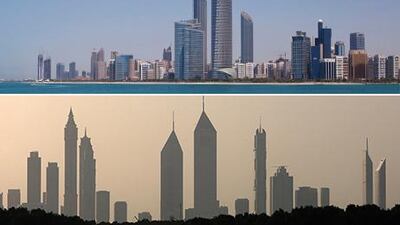Growing demand for goods and services mean there is room for new industrial projects in both Abu Dhabi and Dubai, said a senior economic advisor for the Dubai Government.
Gayane Afrikian, senior economic policy advisor at the Dubai Department of Economic Development, said the two emirates would complement each other with their development.
“There is a misconception that if Abu Dhabi or Qatar or Oman are growing it’s going to be bad for Dubai,” she said during a conference in Dubai. “The bigger the pie grows the bigger the share each of the GCC countries will have.”
She was responding to a question from the audience about what Abu Dhabi's recent projects meant for the emirate.
Abu Dhabi has rolled out the Khalifa Industrial Zone Abu Dhabi, a project that has drawn comparisons to the Jebel Ali Free Zone. It is also developing Abu Dhabi Global Market, a financial free zone similar to the Dubai International Financial Centre.
Ms Afrikian said all of the plans in the region would have their own niche, minimising the risk of competition.
“The more regional countries grow the more complementary and supportive they will become,” she said yesterday during the Trade Credit Insurance Summit.
Officials in both emirates have been keen to emphasise how projects will work in tandem. Kizad is aiming to help Abu Dhabi to become a centre for manufacturing and production and has already attracted new companies such as Brasil Foods, which this month signed a Dh533m investment to open a factory producing food goods. Analysts say Khalifa Port, the hub at the heart of Kizad, will develop more as a port designed to serve Abu Dhabi, leaving Jebel Ali to retain its position as the region’s leading transshipment hub.
Officials at ADGM have also emphasised how it will differ from DIFC by offering new financial products as well as specialising in the handling of physical commodities among other services.
Still, some have questioned the potential conflict between the plans.
“In any region there is a cannibalistic element,” said Ludovic Subran, the chief economist of Euler Hermes, the credit insurance company. “Look at the French and Germans with their car manufacturing. They’re in the same monetary union but they’re competing with each other.”
tarnold@thenational.ae

